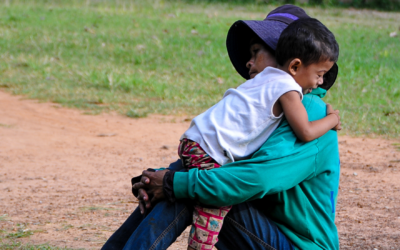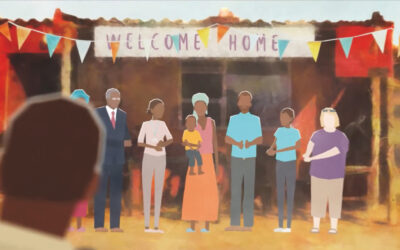This blog is a collaborative piece of work between Hope and Homes for Children, Forget Me Not, The Himalayan Innovative Society, and Martin James Foundation as part of their Developing a Model of Community-Owned Foster Care in Nepal Project.
At a recent three-day workshop in Chitwan, 36 participants, including government officials, child protection organisations, and others, discussed the importance of family and community-based alternative care and made recommendations for change.
Providing alternative care for children is a fundamental human right, and foster care is one of the solutions that can offer a child a family, a sense of community, and a sense of belonging.
Nepal has a large population of young people with 40% of the country under 18, it is, therefore, important to advocate for improved child protection policies and increased investment in their well-being. By nurturing the future of Nepal and providing children with the best possible opportunities, we aim to support every child in order to build a beautiful country and a better world.

Workshop on Family and Community-Based Alternative Care
In line with these efforts, in December THIS, FMN and HHC held a three-day in-person workshop in Chitwan, Nepal supported by the Martin James Foundation.
The workshop’s objective was to sensitise and train Ichchhakamana Rural Municipality, Madi Municipality, and provincial and federal governments on the concept of foster care and its process and to assist them in developing innovative plans to pilot community-based foster care.
This recent session was a follow-up to the two in-person sessions held in April 2021, before the second Covid lockdown, and in September 2022. The previous sessions covered family and community-based alternative care and foster care as an option for children in two institutions operated by both municipalities.
In Attendance
Otto Sestak, HHC Head of Learning and Engagement and Chandrika Khatiwada, National Child Rights Expert, were the key facilitators for the 3-day workshop. Participants included:
- Thirty government officials from Madi Municipality and Ichchhakamana Rural Municipality actively participated in the learning workshop.
- A newly elected Member of Parliament from Bagmati Province also showed his solidarity regarding the importance and need for foster care in our communities.
- Four representatives from Chepang Community, Child Club, Diyalo Pariwar and Afanta Nepal (also Madi Municipality Counselor) from civil society organisations attended the workshop.

Sharing and Discussion
During the workshop, the core theme was that ‘every child is special and family is essential for every child’, and we covered a range of topics, including the following:
- Reinstatement of Foster Care provision in the Children’s Act 2018 – Article 48, children needing special protection and 49 (b);
- Alternative care for children needs to be according to the Principle of Necessity and Principle of Suitability;
- Root factors leading to family separation, children in need of special protection and provision of alternative care for children;
- Role of Foster Care in providing family-based alternative care when necessary – its meaning and its need as one of the solutions for children in need of special protection, role and national legal framework on Foster Care;
- Exchange of experiences and relevant contextual case stories, challenges, practices and solutions from Romania;
- Participation of staff from institutions from the initial phase of the foster care program plays an essential role in its effective implementation;
- Sharing from the Ward President of Ichchhakamana Rural Municipality and Executive Committee Member of Madi Municipality about their personal experience of being informal foster carers.
Workshop Outcomes
At the workshop, we built a deeper understanding and clarity about the need for a robust child protection system at the municipality level with in-built foster care to stop children from entering orphanages and to protect their childhood. We reached a shared agreement that the most vulnerable children are the ones who are currently in the institutions and we need to tailor our support based on the need of each of these children.
Discussions also included creating campaigning ideas to raise awareness of the benefits of foster care, including using social media to encourage potential foster parents to be part of the project and sharing success stories on social media.
In terms of shared outcomes, we decided to continue lobbying and advocating with local government officials for better child protection policies for children and budget allocation for alternative care for children.
Following discussions on challenges and opportunities towards the processes of unpacking foster care in both municipalities, Ichchhakamana Rural Municipality and Madi Municipality officials also drafted a foster care implementation work plan together.
Municipalities also committed to beginning the search for families who may be interested in foster care, conducting data collection – Mother’s Groups and School Teachers were identified as prime sources to identify and collect data on vulnerable children who may need foster carers.
Finally, we drafted an action plan for 28 and 30 potential foster carers to be trained in Madi and IRM, respectively.

Attendee Reflections
Following the workshop, several government officials shared their learnings from the session.
“The case stories we listened to prove to us that wealth alone cannot ensure the right care for children. We must build on small visions to identify, better support and protect children without parental care. Thank you for giving us a positive push to take the courage to search families and provide a family-like setting.” – Mr Khem Prasadh Mahato, Deputy Mayor, Madi Municipality
“Just because we are government representatives does not mean we know everything. So, we should always be open to learning new things. This training opened our eyes to how children can be reunified with their families safely and also to be aware of what happens to children who are not followed up. Apart from the training, now how much we can build on from this training, that is important. We will move ahead abiding by the law and we commit to protect our children by building a better child protection system.” – Ms Maya Silwal, Vice President, Ichchhakamana Rural Municipality
“When it comes to children, we believe that the real issues arise once they start schooling. Then once they reach 20, we push them for marriage without thinking about the consequences in their physical and emotional well-being. What we forget is that child growth begins from the mother’s womb. No vision for development will come alive unless we start working for children from the start. What is the value of pitched roads if teenagers fused with drugs are walking the way? Only when a society is disciplined, development will follow and fall in its place itself.
Unfortunately, many children went to institutions in Madi and IRM despite having parents. We have made some reunifications possible for children together from the support of THIS and FMN. This workshop taught us that family strengthening and preservation must be prioritised and the needed steps to be taken and our responsibilities for the protection of the most vulnerable children. We have our commitment to work together as a team for children.”- Ms Tara Kumari Kaji Mahato, Mayor, Madi Municipality

To learn more about this joint partnership, Developing a Model of Community-Owned Foster Care in Nepal, please visit https://martinjames.foundation/nepal-partnership-announcement/.



